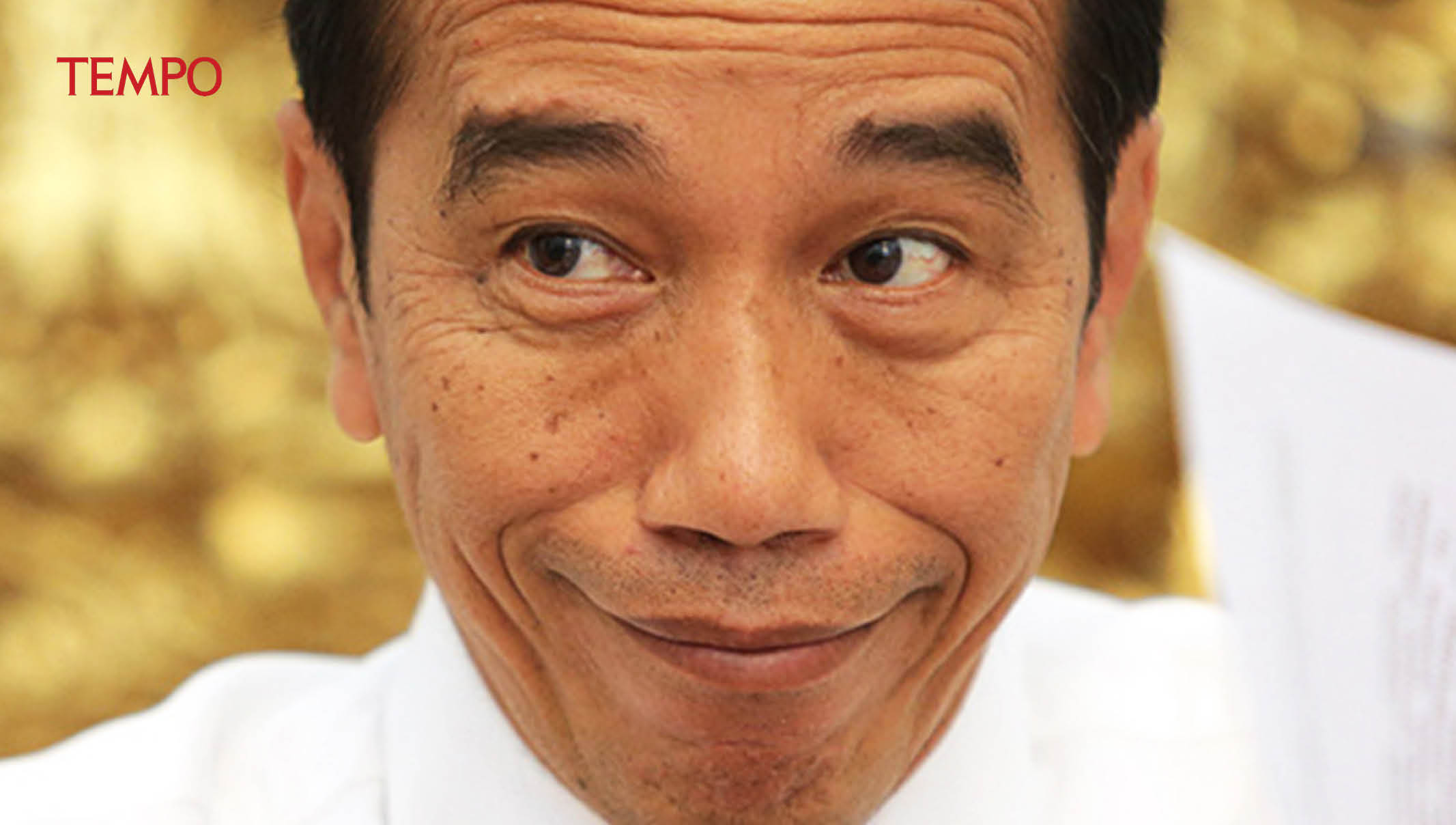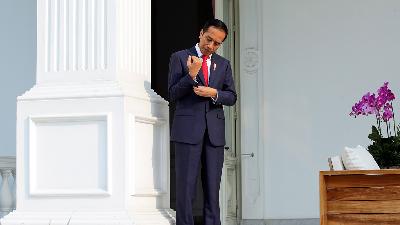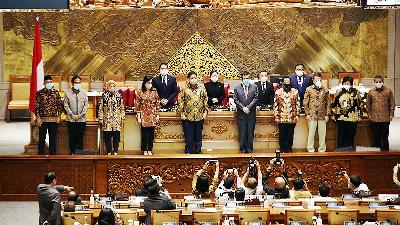The Dissolution of the Good Person Thesis
Monday, July 29, 2024
Jokowi was initially considered as a good person and a man of the people. But he broke the hopes of those who voted for him.
arsip tempo : 174577975938.

TEN years ago, on July 22, 2014, the General Election Commission declared the pairing of Joko Widodo and Jusuf Kalla to be the winners of the presidential election with 53.15 percent of the vote. Jokowi’s background in the furniture business meant that his campaign slogan of “Jokowi is us” struck a chord with the majority of Indonesia’s voters. He was not part of the old elite that was corrupt and distant from the majority of the people.
Jokowi’s political career began at the bottom. Elected Mayor of Solo in 2005, he led this small city in Central Java in a humanitarian way. While many governors and regents employed violent tactics to relocate disorderly market traders, Jokowi repeatedly used persuasion. He continued this humble leadership style when he became Governor of Jakarta in 2012.
His campaign team attached the image of a man of the people to Jokowi through his public blusukan (unannounced visits), and the slogans “work, work, work” and “good people vote for a good person.” Jokowi raised hopes that Indonesia would become a developed country that sided with the people. Prabowo Subianto and Hatta Rajasa, two politicians from the elite level of society who were his rivals, were defeated.
As a politician who was not an activist, not a tycoon, and not the owner of a political party, Jokowi faced significant obstacles from the political network that had been established since the days of the New Order regime. Without the full support of his own party, the Indonesian Democratic Party of Struggle (PDI-P), Jokowi strengthened his position by embracing other parties with the majority of seats in the House of Representatives (DPR). He embraced Golkar, aligned himself with the National Democrat (NasDem) Party, which had supported him from the outset, and moved closer to the small and medium sized parties that enjoyed the support of moderate Muslim voters.
This consolidation led to victory when he ran again in the 2019 presidential election. Jokowi’s share of the vote rose significantly compared to that of Prabowo, who once again ran against him. In the 2014 election, the difference between the two was only 6.3 percent, or 8.42 million votes. In 2019, the gap widened to 11 percent, or 16.96 million. Indonesian Ulema Council Chair Ma’ruf Amin was recruited as vice-presidential candidate to attract Muslim voters.
Ma’ruf was a key figure in the 2017 demonstrations against Jakarta Governor Basuki Tjahaja Purnama, who had been accused of blasphemy. Even though Jokowi was portrayed as a defender of Basuki, and the move to pair with Ma’ruf can be considered as a betrayal, voters did not bother. They once again were charmed by Jokowi’s campaign promise to “show no hesitation in implementing every program” from his first term during his second tenure. It turned out that this lack of hesitation referred to Jokowi’s endeavor to accelerate the construction of infrastructure and increase investment, which had been his aims from the start and which became his paradigm for advancing Indonesia.
After he was inaugurated for his second term, he emphasized that he was no longer prioritizing the upholding of human rights or environmental protection, because these were only obstacles to investment.
Another obstacle was the independence of the Corruption Eradication Commission (KPK). Jokowi claimed that the KPK was stalling development. With the consolidation of the parties established in his first term, he undermined the anti-graft agency through a revision to the KPK Law at the end of 2019. After this, the KPK was no longer an independent body, but part of the executive, with the president as decision maker and controller.
After paralyzing the KPK, Jokowi also brushed aside regulations he believed were hampering the entry of foreign capital to Indonesia. He synchronized, changed or deleted articles from 75 laws he believed deterred investors, and this was all realized in the omnibus Job Creation Law.
This omnibus law, unknown in civil law nations like Indonesia, was passed in order to make things easier for investors, but did not take the side of laborers and was a threat to the environment. The Job Creation Law was used to justify deforestation—the main reason for the increased production of the greenhouse gases that have caused climate crisis.
In order to protect and provide guarantees for investors, the Job Creation Law simplified requirements for setting up companies. Environmental impact analyses could now be approved without the need to involve the opinion of the people directly affected or members of the public. Anyone protesting against national strategic projects was considered as obstructing development, meaning they could be jailed.
Jokowi’s way of legalizing authoritarianism became even more arbitrary as he neared the end of his second term. He wanted to revise the Constitution so he could serve a third term. But this failed because of public protests and the lack of support from the parties. But Jokowi succeeded in using the Constitutional Court, chaired by his brother-in-law, to change the General Election Law to allow his son, who was under the minimum age, to run for the vice-presidency.
But even with all of this, the Indonesian economy has fallen short of hopes. Average annual economic growth in the last decade has been only 4.73 percent—far lower than that during the era of President Susilo Bambang Yudhoyono, when it was 6.22 percent. And the burden on Indonesia’s finances has become heavier because of the collapse of state-owned enterprises as a result of debts incurred carrying out Jokowi’s orders to build infrastructure. During his presidency, the government's additional debt has reached Rp5,745 trillion, three times the additional debt accumulated during President Yudhoyono’s two terms.
This disarray has undermined democracy and the hopes of the 1998 Reformasi movement. The military has reentered the bureaucracy with postings in civilian institutions. The KPK, National Police and Attorney General’s Office have become institutions used to strike against political opponents using legal cases. The DPR is only a rubber stamp for government policies, despite the dangers to state finances. There is no longer any system of checks and balances, which is the cornerstone of democracy.
Indonesia has become a nation that has lost its democracy despite being led by people who were democratically elected. Together with other nations such as Hungary, Brazil, Turkey and the United States in the Donald Trump era, according to Francis Fukuyama, Indonesia is now afflicted with the four characteristics of democratic reversal: a legal system that is not impartial, a bureaucracy that is not neutral, excessive executive power, and media that is not independent.
It is not surprising that according to the democracy index of the V-Dem Institute at the University of Gothenburg, Sweden, Indonesia is ranked at number 87, with a score of 0.36, down from a ranking of 63 in 2014. The Anti-Corruption Behavior Index from Statistics Indonesia also fell from 3.84 in 2020 to 3.76 in 2024. These figures reflect dirty political practices, especially the political dynasty established by Jokowi at the end of his presidency.
In addition to intervening to help ensure his son's election as vice-president by deploying government employees and using social assistance funds, Jokowi also supported and promoted his youngest son, his son-in-law, and even his adjutant in the regional head elections. After failing to extend his own presidential term, he managed to maintain his position of power through members of his family and people close to him.
With all this improper conduct, there are no huge waves of student demonstrations as in 1998, when Suharto stepped down. Jokowi has learned much from Suharto’s errors in building an authoritarian regime without public opposition. As well as silencing the DPR and the mass media, Jokowi has paralyzed intellectual groups by bringing civil society groups into his power and using his regime’s right to select university rectors.
In several occasions, disruption to the Internet has led to public protests, but online anger was quickly stifled through the deployment of digital influencers, or buzzers, and hired experts to participate in debates on social media. With his gimmick of being a man of the people, and avoiding frontal confrontation with critics, Jokowi has created a confusing polarization in response to the type of authoritarianism he has established.
In Jokowi’s hands, this authoritarianism is not displayed provocatively. He deceives anyone who hopes Indonesia will break free from the elitist rule of the previous president. In his two terms, Jokowi has destroyed the thesis of the good person that once brought so much hope to the people of Indonesia.











